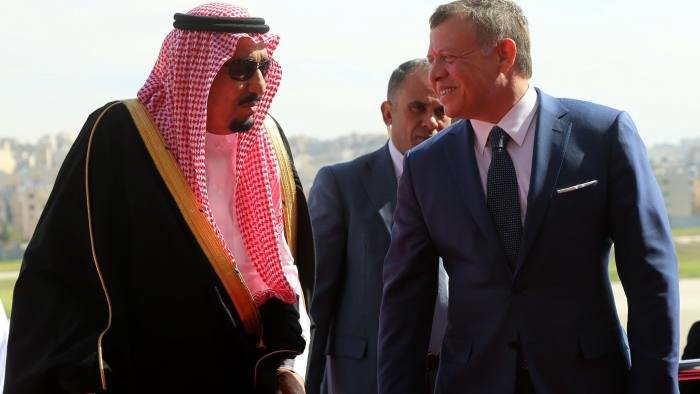How Trump’s Jerusalem move compromises fragile ally Jordan

Of all the acts of political vandalism Donald Trump has committed during his first year in the White House, among the most gratuitous was his decision last month to recognize Jerusalem as the capital of Israel. It thereby foreclosed on any possible two-state outcome to the Israeli-Palestinian conflict, in which the occupied Arab east of the holy city would become the capital of an independent Palestine.
East Jerusalem, captured by Israel in the 1967 Six Day war and then illegally annexed, is at the religiously combustible core of a conflict that, although recently eclipsed by the ferocity of the civil war in Syria and the struggle against ISIS, risks being reignited. But President Trump’s Jerusalem decision also compromises a fragile western ally, Jordan, which has been a pivot of regional stability. Jordan’s Hashemite monarchy, in its current incarnation of King Abdullah, is descended from the house of the Prophet Mohammed. In Muslim belief, the prophet rose to heaven from the Dome of the Rock, which is inside the old city’s Haram ash-Sharif, or Noble Sanctuary, containing al-Aqsa mosque and known to Jews as Temple Mount. By tradition as well as by Jordan’s 1994 peace treaty with Israel, the Hashemites are the guardians of Jerusalem’s Islamic (and Christian) holy places. Any change in the city’s status strikes at their legitimacy. That is serious enough, but it is not all.
The kingdom is vulnerable to destabilizing deals between the U.S. and Saudi Arabia.
The majority of Jordan’s population is Palestinian, refugees from the Arab-Israeli wars of 1948 and 1967. Hardline irredentists in the rightwing Israeli government led by Benjamin Netanyahu, emboldened by U.S. recognition of Jerusalem, are pushing to annex big chunks of the Palestinian West Bank colonized by Jewish settlers. They are also reviving the old “Jordan is Palestine” mantra, insisting the Palestinians already have a state: Jordan. For Jordan this is existential. Its leaders fear Israel will trigger a third exodus of Palestinians across the Jordan river, and sabotage the already fragile demographic balance of the kingdom.
After the Trump move on Jerusalem, King Abdullah told the Organization of Islamic Cooperation, the 57-member umbrella group of Muslim countries, that a consensual solution to Jerusalem was “the key to ending the historical conflict in the Middle East”. The OIC, founded half a century ago in response to an arson attack on al-Aqsa mosque, responded to the U.S. president’s act of political arson by declaring East Jerusalem the capital of Palestine. Empty rhetoric? Mostly. But it contains within it the kernel of a new religious war over Jerusalem for any extremist who wants to grasp it. While Trump’s erratic behavior has been well charted, a puzzle remains: the position of Saudi Arabia, under the de facto rule of its young crown prince, Mohammed bin Salman, or MbS. The Saudis criticized the U.S. Jerusalem move, but sent low-ranking officials to the OIC summit to discuss it. The Saudis put pressure on Jordan to do the same. But King Abdullah went anyway.
Jordan also voted in condemnation of the U.S. decision at the UN General Assembly, risking American reprisals — in Jordan’s case, vital aid worth $1.2bn last year. Jordan says it received only two-thirds of the help it needs to look after the roughly 1m Syrian refugees inside its borders. Abdullah’s father, the late King Hussein — the gold-standard of west-leaning Arab moderation of his time, who attended 45 clandestine meetings with Israel in his search for peace — faced similar quandaries. King Hussein knew the Arabs’ defeat was likely in the 1967 war but took part anyway, losing the West Bank and East Jerusalem to Israel.
He stood apart from the U.S.-led coalition to eject Saddam Hussein from Kuwait in 1990-91, knowing he faced ostracism and a period of penury. All of this was trumped by the need for legitimacy. After all, his own grandfather (the present king’s great-grandfather) the arch-pragmatist King Abdullah I, was assassinated at al-Aqsa mosque in 1951 after a campaign accusing him of collaboration with Zionist Israel. Some in Jordan and elsewhere in the Arab world now believe Saudi Arabia is colluding with the U.S. to impose a blatantly pro-Israel solution on the Palestinians — and that Jerusalem is the first instalment. MbS has met regularly with Trump’s son-in-law, Jared Kushner, mandated by the U.S. president to deliver the “ultimate deal”. Based on what is dribbling out from stunned Palestinians, this would amount to supra-municipal government in disconnected cantons of the West Bank, with the town of Abu Dis on the edge of Jerusalem as a “capital”.
This ticking bomb of territory might even be attached to an unwilling and vulnerable Jordan. This, a dangerous fantasy, might actually be attempted under President Trump. There is suspicion that the House of Saud even wants to take oversight of Jerusalem’s Islamic sites from the Hashemites — MbS’s grandfather took the holy cities of Mecca and Medina from them by conquest in 1925. But legitimacy matters. Saudi monarchs prefer to style themselves custodians of the holy places rather than kings, and Jerusalem might be a step too far. King Abdullah, moreover, is a moderate leader in a region where mainstream Sunni leadership has almost died out. MbS says he wants to revive it, but it looks at present as though he is helping undermine one of its rare exemplars.
(Source: FT)
